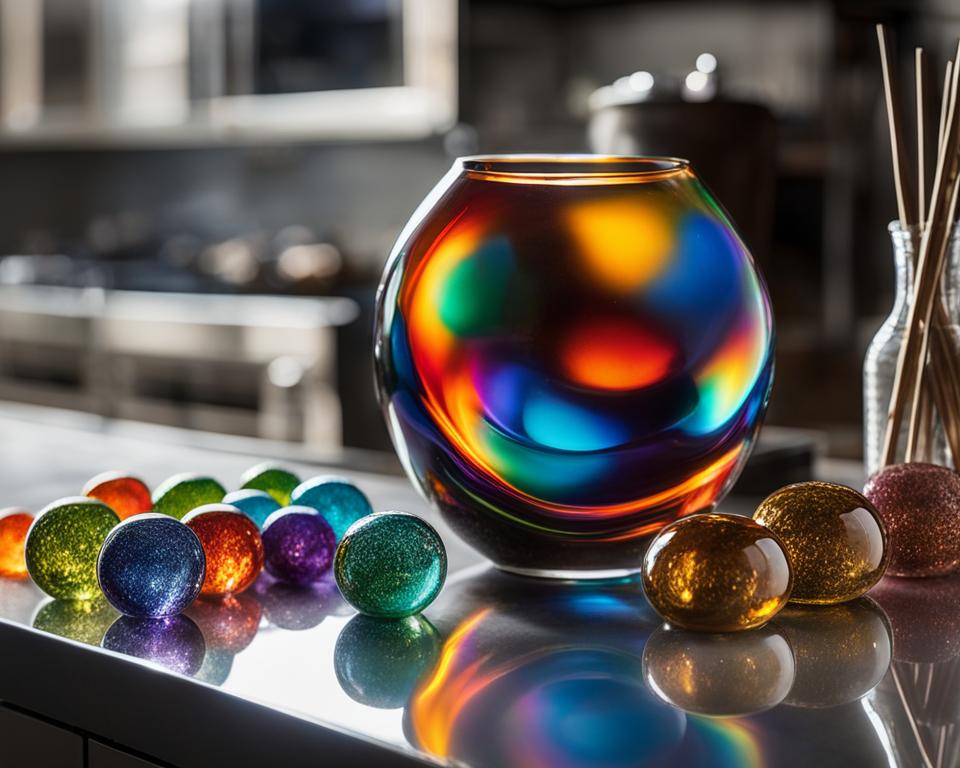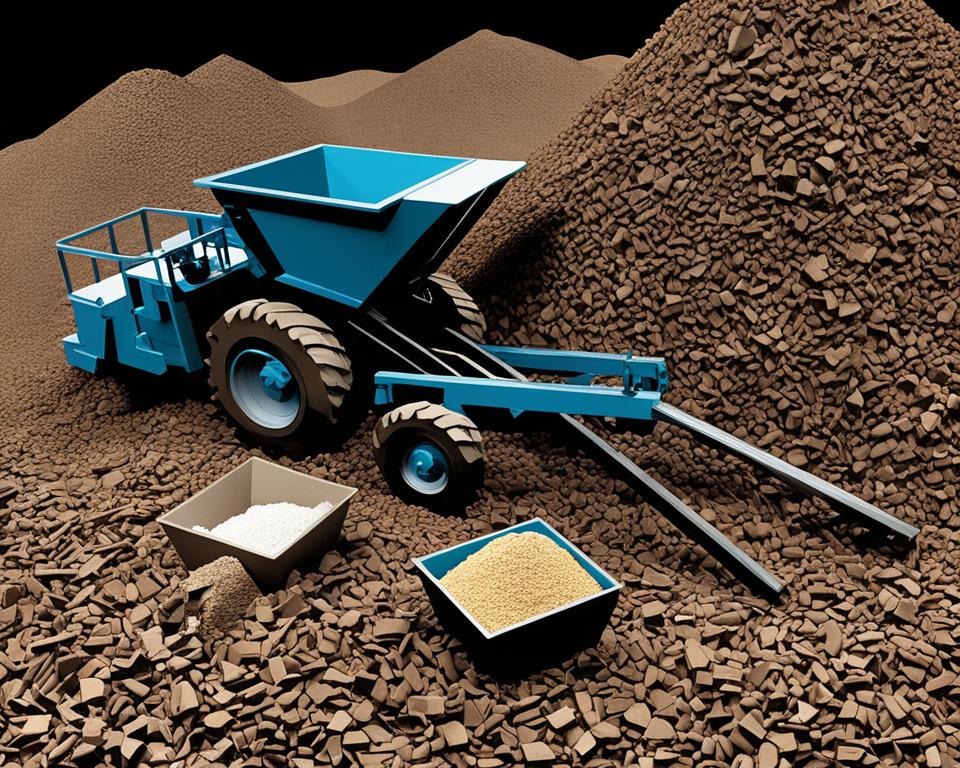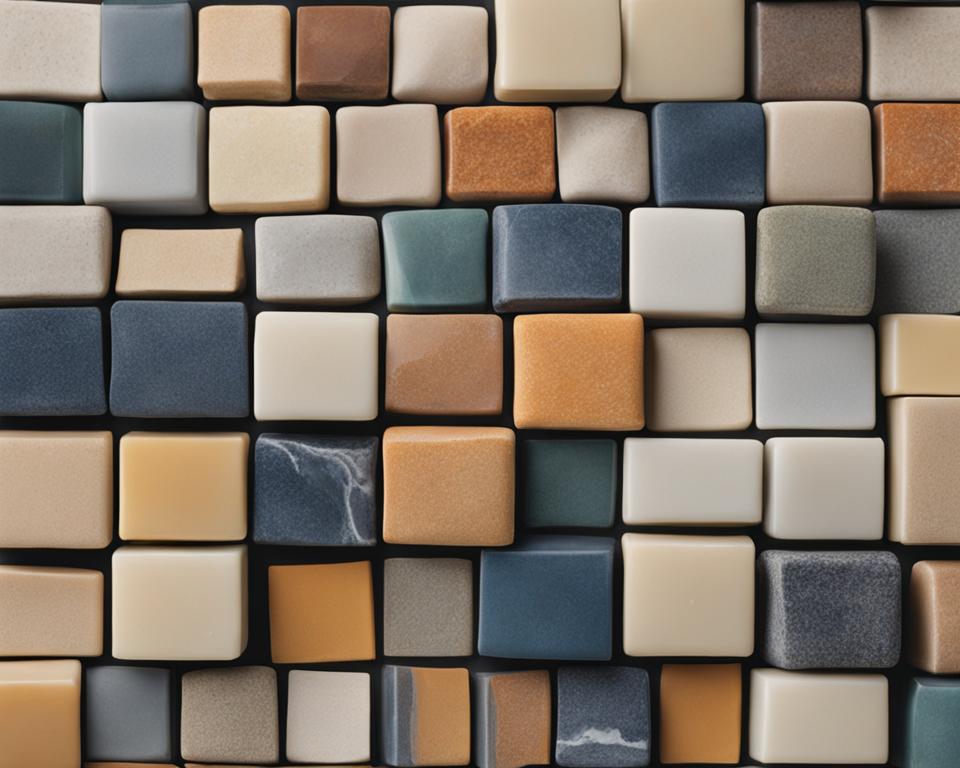Feldspar is a versatile mineral that is widely used in various industries and everyday products. Its unique properties contribute to the functionality and aesthetics of many items that we use on a daily basis.
In this article, we will explore the various uses of feldspar, from glassmaking to construction materials. We will delve into the role feldspar plays in enhancing the strength, durability, and appearance of ceramics, paints and coatings, and other products. We will also examine its potential in abrasives and as a filler in plastics and rubber products.
Key Takeaways:
- Feldspar is a versatile mineral with a wide range of applications across industries.
- It is a key ingredient in the glassmaking process, providing thermal stability and reducing the risk of cracking.
- Feldspar is essential in ceramics, improving the firing temperature, and enhancing their strength and durability.
- It contributes to improving the performance and durability of paints and coatings, making them suitable for both interior and exterior applications.
- Feldspar is a crucial component in the production of abrasives, used in metalworking, woodworking, and construction.
Glassmaking
Feldspar is a critical component in the production of glass. Its high alumina content helps to stabilize the glass structure, making it less susceptible to thermal expansion and minimizing the risk of cracking. Feldspar is also an important fluxing agent, reducing the glass’s melting temperature and improving its workability.
Glass products that contain feldspar are commonly used in everyday life, including windows, bottles, tableware, and decorative objects. Feldspar provides these products with the necessary properties for functional and aesthetic purposes, ensuring they are both visually appealing and robust.

Feldspar glass is utilitarian yet beautiful, and its applications span across numerous industries. The combination of feldspar and other essential materials creates a product that is both functional and aesthetically pleasing, making it a vital component to many household items and commercial enterprises.
Ceramics
Feldspar plays a significant role in the ceramics industry by functioning as a fluxing agent and lowering the firing temperature of clay-based substances. This makes it an indispensable component in the manufacturing of ceramic tiles, sanitaryware, tableware, and pottery.
Moreover, its addition enhances the strength, durability, and appearance of ceramic materials, making them more resistant to breakage and wear and tear while also maintaining their aesthetic appeal. The use of feldspar in ceramics results in products that can withstand everyday use and still look great.

Paints and Coatings
Feldspar plays a vital role in the formulation of paints and coatings. Its unique properties allow it to act as a filler, improving the pigment dispersion and overall performance of the product. Due to its fine particle size, feldspar enhances the opacity and texture of the paint, giving it a smooth and even finish. Additionally, feldspar contributes to the paint’s durability, making it suitable for both interior and exterior applications.
The incorporation of feldspar in coatings provides excellent resistance to weathering, chemicals, and abrasion. Feldspar coatings are widely used in the automotive industry for their ability to protect the vehicle’s surface against harsh environmental conditions. The inclusion of feldspar in powder coatings enhances the material’s adhesion and improves its resistance to corroding agents and UV radiation. Furthermore, feldspar coatings are employed in metal packaging, flooring, and marine applications.

Environmental Impact
The use of feldspar in paints and coatings has some environmental advantages. Since feldspar is a naturally occurring mineral, it is a sustainable and eco-friendly alternative to synthetic additives. Moreover, feldspar coatings are non-toxic, reducing the potential harm they could cause to the environment and human health.
Abrasives
Feldspar is a widely used in the manufacturing of abrasive products such as grinding wheels and sandpapers. Its hardness and abrasive properties make it an excellent material for removing unwanted surfaces, smoothing rough edges, and polishing various materials. Feldspar abrasives are essential in industries such as metalworking, woodworking, and construction.

The use of feldspar in abrasive products proves exceptionally useful due to its durability and versatility. It ensures that abrasive products have commendable strength while retaining their necessary features, thus making them ideal for several applications in multiple industries.
Construction Materials
Feldspar is a versatile mineral that finds its way into different types of construction materials. Its ability to enhance strength, durability, and resistance to weathering makes it an essential component in modern construction.
One of the most common uses of feldspar in construction is in the production of concrete. Feldspar’s ultra-fine particles fill the gaps between the cement and the aggregate, increasing the density and compactness of the concrete mix, which reduces the risk of cracking. Additionally, feldspar is also used in the production of roofing tiles, insulation materials, and decorative aggregates.

Furthermore, feldspar’s versatility is aided by its availability, making it an affordable material, which builders can easily access in large quantities.
Feldspar’s Other Versatile Uses
Aside from its prominent applications in glassmaking, ceramics, paints, coatings, abrasives, and construction materials, feldspar has several other miscellaneous uses across different industries.
Feldspar is a crucial component in the production of welding materials, particularly welding electrodes. The mineral acts as a flux, ensuring efficient metal joining by facilitating the removal of impurities.
Feldspar also finds use in the manufacturing of electronic components such as insulators, capacitors, and resistors. In this case, the mineral provides insulation, enhances the mechanical properties of the ceramics, and ensures optimal performance of electronic devices.
Furthermore, feldspar is an essential filler in various plastic and rubber products. Its particle size and unique properties enable efficient reinforcement and provide desirable end-use properties to the finished products.
Other emerging uses of feldspar include its utilization in the production of batteries, where it acts as a potassium and lithium source. The mineral also finds use as a purification agent in the purification of waste water, as a fertilizer to improve soil fertility, and as a flux in the manufacturing of certain glasses and enamels.
Overall, feldspar’s diverse range of applications highlights its importance in various fields. Its unique properties and ability to contribute to the functionality, strength, and aesthetics of different products make it a valuable mineral with endless possibilities.




